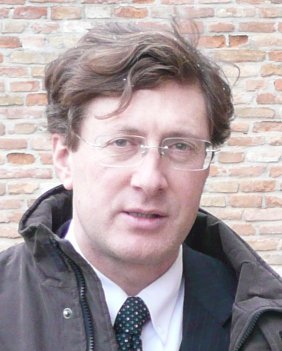Antonietta Mira - Università della Svizzera Italiana and Insubria University,
Andrea De Gaetano - National Council of Research of Italy
Modeling the pandemic is difficult: hopes and doubts about model building
Jean-Philip Piquemal - Sorbonne University
Modeling SARS-CoV-2 Proteins using Molecular Dynamics and Polarizable Force Fields
Tuesday May 12 2020
Antonietta Mira

Modeling the pandemic is difficult: hopes and doubts about model building
We will explore the role of both statistical and deterministic models in providing reasonable guidance for extrapolation with data that are insufficient, both in terms of quality and quantity. The concept of what constitutes a good model to support decision makers will also be discussed.
Antonietta Mira is professor of Statistics and director of the Data Science Lab, that she founded in 2017, at Università della Svizzera italiana, Lugano, Switzerland. She is also member of the Swiss Federal Statistical Committee, professor at Insubria University, Como, Italy, fellow of the International Society of Bayesian Analysis and of the Istituto Lombardo Academy of Science and Letters, since 2016. Since 2019 she is member of the board of the Harvard Data Science Review, and last year has chaired the Savage Award committee of the International Society for Bayesian Analysis (award of which she was recipient in 1998). She has been a visiting fellowship at Harvard, Cambridge, QUT in Brisbane and holds memberships to several advisory board memberships. She is also PI or co-PI of competitive research grants for approximately 2.000k CHF.
Her main research interests are: Statistical models for complex data, uncertainty quantification, model selection and Monte Carlo efficient simulation algorithms.
In her free time Antonietta is a practitioner magician with specific interest in mathematical magic on which topic she wrote the book in 2012. This is only one of her activities aimed at science popularization which include the creation of an exhibit, Numbed by Numbers! a 3D tour between Digits (math), Dice (probability) and Data (statistics) aimed at kids age 6 to 18.
Andrea De Gaetano

Modeling the pandemic is difficult: hopes and doubts about model building
We will explore the role of both statistical and deterministic models in providing reasonable guidance for extrapolation with data that are insufficient, both in terms of quality and quantity. The concept of what constitutes a good model to support decision makers will also be discussed.
Andrea De Gaetano is an Italian biomathematician working with the National Council of Research of Italy in Rome. He is an M.D. with a specialty in Emergency Surgery, M.Sc. and Ph.D. in Applied Mathematics, and Juris Doctor admitted to the Italian Bar. He is Director of Research with CNR Institute for Systems Analysis (IASI) and adjunct professor of Mathematical Statistics with the Dept. of Mathematics at Mahidol University Bangkok.
With his colleagues at CNR IASI BioMatLab in Rome he studies mainly deterministic and stochastic dynamical system problems in mathematical physiology (using ordinary, partial, delay, stochastic and fractional differential equations). He is interested in both the modeling of physiological systems and in the statistical estimation of the model parameters, and has published some 160 extended papers on peer-reviewed journals so far. He is the current president of the European Society for Mathematical and Theoretical Biology. Among his non-professional interests are motorbike riding, playing baroque trumpet (very poorly), building rocket stoves, raising donkeys and clearing woodland from thorn bushes.
Jean-Philip Piquemal

Modeling SARS-CoV-2 Proteins using Molecular Dynamics and Polarizable Force Fields
In this talk, I will present some aspects of our COVID-HP PRACE project aiming at obtaining a structural and dynamical description of the components of the Sars-Cov-2 virus through extensive new generation polarizable molecular dynamics simulations (AMOEBA force field) using the massively parallel/multi-GPUs Tinker-HP software. To do so, we are currently building large-size models of the various proteins of the virus in link with recently available experimental data in order to produce large, high-resolution, ensembles using polarizable molecular dynamics for post-treatment screening purposes and QM/MM studies. I will focus my talk on the description of our modeling efforts dedicated to the Spike and Main protease (Mpro) proteins. Such computer models will help scientists to design new drugs able to neutralize the coronavirus by preventing it from entering human cells or by blocking its internal machinery.
Jean-Philip Piquemal is Professor of Theoretical Chemistry at Sorbonne Université and Director of the Laboratoire de Chimie Théorique (LCT), a joint research center with CNRS. He is also junior member of the Institut Universitaire de France and Adjunct Professor of Biomedical Engineering at the University of Texas in Austin. Since 2019, he is Principal Investigator of the Extreme-Scale Mathematics-based Computational Chemistry ERC Synergy project. His team develops the massively parallel Tinker-HP simulation package dedicated to new generation polarizable force fields molecular dynamics. Professor Piquemal’s research is focused on methodological developments for multiscale quantum chemistry methods and new generation force fields. His research group is mainly interested in large scale applications of these techniques to biological systems including metalloproteins with a strong interest for many-body effects, chemical reactivity and drug design. In 2018, he was awarded the Atos Joseph Fourier Prize in High Performance Computing.
<
Q & A

 About
About
